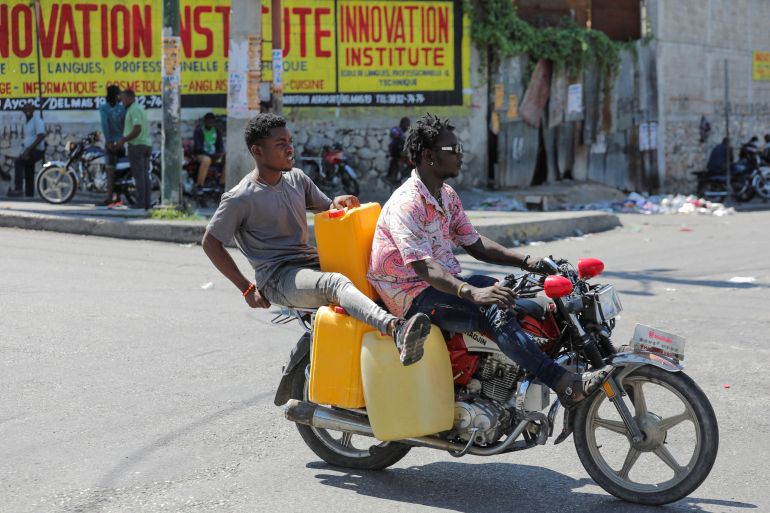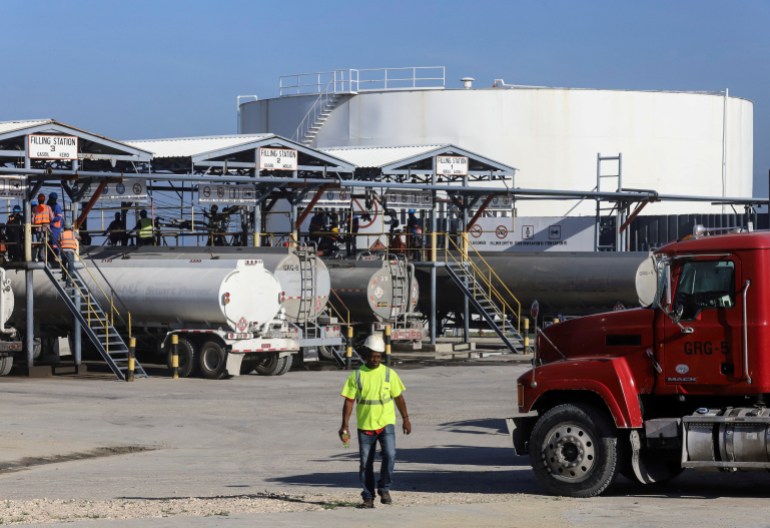Haiti hospitals prepare to close as gangs blockade fuel supplies
As Haitian hospitals beg for fuel supplies, a United Nations official warns ‘life-saving services risk coming to a standstill’.

Hospitals that rely on fuel-powered generators for electricity in Haiti’s capital have warned they could be forced to close, as a gang blockade on the main fuel terminal in Port-au-Prince worsens insecurity in the Caribbean nation.
Port-au-Prince gangs earlier this month dug trenches and littered shipping containers at entrances to the Varreux terminal to protest a government announcement that it planned to cut fuel subsidies due to their high cost.
Keep reading
list of 3 itemsMisery deepens in Haiti as unrest rages and water shortages bite
Haiti facing ‘humanitarian catastrophe’, says UN envoy
Three-quarters of the major hospitals in Haiti are affected by the lack of fuel, the United Nations Children’s Fund (UNICEF) said in a statement this week, citing data collected by the World Health Organization.
“Some hospitals are unable to admit new patients and are preparing to close. Providing sterile conditions for medical interventions is becoming more challenging and conserving vaccines due to the disruption to cold-chain facilities has become problematic,” UNICEF said.

It added that approximately 22,100 children under age five, as well as more than 28,000 newborns, were at risk of not receiving “essential health care services” over the next four months.
Bernard Mevs Hospital in Port-au-Prince said on Tuesday that it was cutting down on staffing and services as a result of the lack of fuel. “In the face of this difficult and sad reality, we cannot say when the hospital will be able to resume normal operations if this shortage continues,” the hospital said in a statement shared on Facebook.
“We hope not to have to close completely,” the hospital said, calling for help in getting additional supplies of diesel.
Haiti has seen rising gang violence after the assassination of President Jovenel Moise in July last year plunged the country into even deeper political instability.
Violence has soared in Port-au-Prince as armed groups battle for control, with international aid groups warning that food insecurity was set to worsen as a result of the attacks.
A World Food Programme official on Monday said that UN agencies and non-profit organisations lost some $6m worth of relief supplies during the violence.
In mid-September, Haitian authorities also announced that the price of gas will more than double, with slightly smaller increases for diesel and kerosene. The move prompted large protests in several cities, as demonstrators said they were already struggling with soaring costs of living.
The electricity supply from Haiti’s grid is so unsteady that most businesses and offices cannot maintain operations without power provided by diesel generators.
Due to a lack of power, radio station Magik 9 on Tuesday had to halt its morning programming as it was conducting interviews regarding the critical situation created by fuel shortages, one of the station’s directors wrote on Twitter.
Around 30 percent of antennas operated by Digicel, Haiti’s largest mobile phone provider, were out of fuel, Digicel Chairman Maarten Boute wrote on Twitter on Tuesday.
In a letter dated September 23 and shared on social media, the president of Fondation Saint-Luc, an organisation that offers healthcare services in Haiti, said two hospitals and a physiotherapy centre might be forced to close because their emergency fuel reserve had nearly run out.
“In the absence of an immediate bailout, we will have little choice but to see a shutdown of healthcare services at the two hospitals (Saint-Luc and Saint-Damien) and the Sainte Germaine Physiotherapy Centre,” Father Richard Frechette said.
Ulrika Richardson, the UN resident and humanitarian coordinator in Haiti, said in Monday’s UNICEF statement that “lives are being lost in Haiti because hospitals are unable to access fuel”.
“If this situation continues, life-saving services risk coming to a standstill, including for pregnant women, newborns and children, as well as for persons suffering trauma and other life-threatening conditions,” Richardson said.